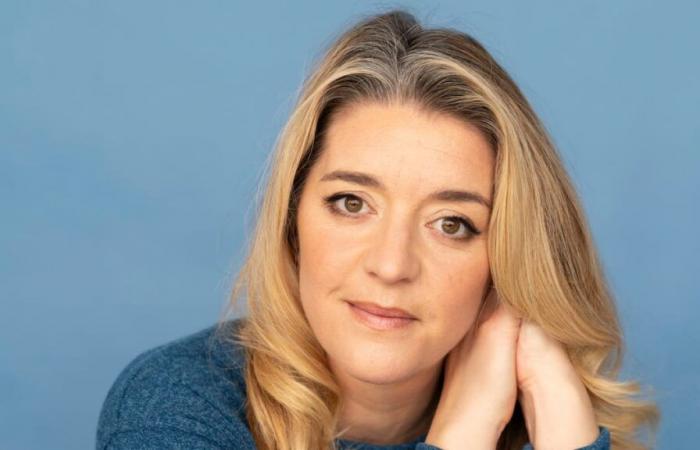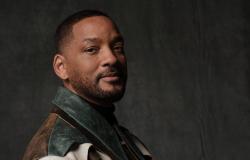Marked by the death of her father, the actress wanted to demystify the grieving process by creating her podcast. Furthermore, both on stage and on television, Marie-Ève Perron continues to explore these subjects which affect her closely.
• Also read: Marie-Ève Perron explains why she and Christian Bégin waited so long before appearing
• Also read: Christian Bégin and his partner, Marie-Ève Perron, are involved in a joint project
Marie-Ève, you launched your podcast, We’re all going to go through itin November. At the same time, you will give other performances of your show Of your strength to live in 2025, and from January, we will be able to discover you in the new series Come to the living room. These three projects have death and mourning in common…
I know, I have the theme of death that sticks to me. (laughter) Fortunately Come to the show is a comedy! I admit that, when this beautiful series, which addresses death, was presented to me, while I already had both feet firmly planted in my play and my new podcast, I still found it funny that it takes place in the world of funeral homes… but I took it as a nice wink. (laughter)
And what can you tell us about the character you play?
I play Cindy, a widow who goes to the funeral home for arrangements for her deceased husband. But as he cheated on her so much, she didn’t care much about his departure, to the point where she had a romance with the director of the salon. I really had a blast playing this with a great team. I can’t wait to see the result!
In your podcast and your show, you talk about death and mourning. Why did you want to demystify these subjects?
It was with the death of my father in 2016 that everything took shape. My father was a Crown prosecutor. He had his family and a full life, but at age 64, illness struck him. He suffered from two combined degenerative diseases. Additionally, he was not responding to any medication and nothing could help him or slow the degeneration, so he was wasting away quickly. For five years, I accompanied my father through illness, until his death. It was a great ordeal and a whole journey of finding myself in deep mourning. I had anger inside me and I was lost. I lived it hand in hand with my brother. Luckily he was there and I could lean on his shoulder. As for the rest, I barely talked about it. I was vague in describing the situation, and felt unable to talk about the emotions I was feeling. I was confused. How could I explain it to others, when I couldn’t even explain it to myself?
Were you in denial?
I don’t think so, no. But I don’t think anyone is really prepared to see their parent diminished like this and to see them quickly waste away. It was a shock and I tried to accompany him as calmly as possible. The state of mind I found myself in was confused and what shocked me the most was seeing all the silence around death. Obviously, I couldn’t show up at a dinner with friends sharing the details of my father’s condition, it was too heavy. But it made me realize how much we lack tools when it comes to dealing with death and mourning.
Death is still a very big taboo in Quebec…
Yes, it’s incredible! We are not comfortable talking about death. We don’t really know what to say when someone close to us loses a loved one. So we cling to phrases we know, like: “He’s better off where he is now.” Honestly, I wanted to scream when someone said that to me! I talk about it in my play, and everyone laughs at the time. So, I must not be the only one who hates this sentence. (laughter) We need to talk about it. If there is one thing that is inevitable in life, it is death, our own and that of those we love. As we are all heading towards this, we need to be better equipped and not hide. My father was part of that generation of men who never talk about their fears or even their emotions. He was afraid of dying and he never talked about it. And unfortunately it’s too common. In my podcast, I talked about it with Luce Des Aulniersa great specialist in the field. She is a professor, researcher and author. I had known Luce for several years and speaking with her greatly helped and guided me in my grief. In fact, Luce has even influenced the relationship I have with life today. Thanks to her, I understand my humanity better, because she gave me tools. A chance, because I felt great guilt towards my father, shortly after his departure.
What did you feel guilty about?
I carried the guilt of not having spoken with him about the death that was coming, because there was this modesty between us on the subject. So that’s probably where my desire to talk about it openly started; from the moment I started talking about my father’s death, my emotions and my grief. As a result, there was a calm that settled within me, and I realized that, in death and mourning, everything is not black and white. There are a lot of gray areas. In my podcast, I provide tips and keys to the different stages of grief, hoping that people who listen to it will feel better equipped for the future. This is the goal of this podcast, which I have been working on for several years.
You are in a relationship with Christian Bégin, and you are even married! Is it thanks to your journey with grief that you felt ready and open to love?
In fact, in front of Christian, I was made connected to myself and my life. I was ready to experience this because of several small losses that I had gone through, but it was not because of the death of my father. Before meeting Christian, I had suffered losses in personal and family relationships, then the loss of my home, and all of this meant that I reconnected with my essence and that I rebuilt myself over the years. There really are all kinds of grief in life…
And today, where are you in the process of grieving your father?
Today, I can say that I am at peace with his departure, even if sadness sometimes returns. I must say that his last moments were discouraging, because he was in agony and suffered a lot. I felt angry for a long time. I was at broil, because he didn’t deserve this and he should have had a gentler and more peaceful death. And at the same time, if his death had been gentle and beautiful, I would never have written the play On Your Strength to Live or even prepared a podcast. So it had to be like this. Now, when I think of my father, I especially feel a deep love.
We follow Marie-Ève on social networks. The podcast We’re all going to be there is available on the platforms. For the dates of Of your strength to livefind out more at www.filledepersonnel.com. The new series Come to the showdirected by Jean-Carl Boucher, will be presented on TVA on Wednesdays at 9 p.m., starting January 8.






